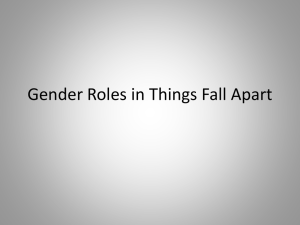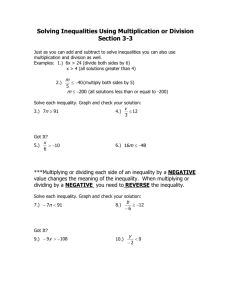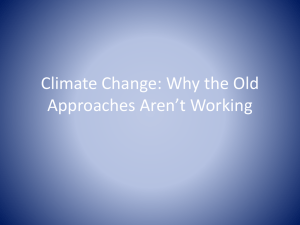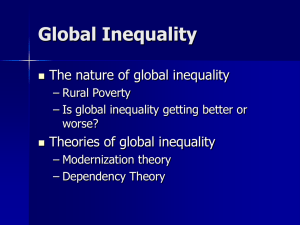Gender - Thewayweare
advertisement
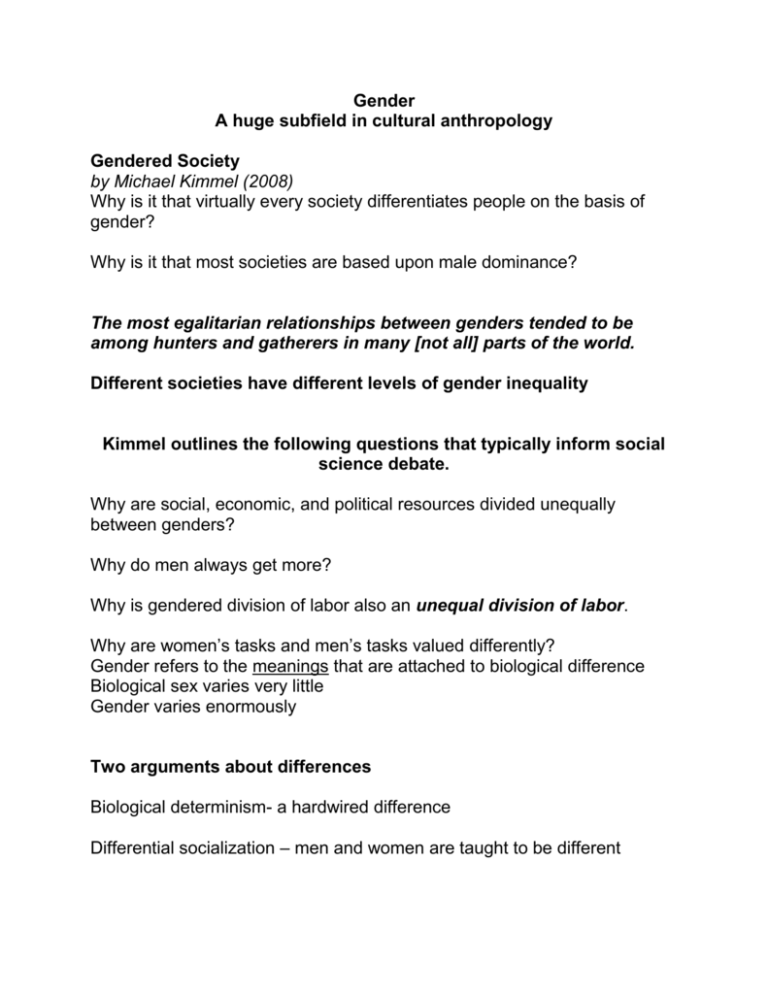
Gender A huge subfield in cultural anthropology Gendered Society by Michael Kimmel (2008) Why is it that virtually every society differentiates people on the basis of gender? Why is it that most societies are based upon male dominance? The most egalitarian relationships between genders tended to be among hunters and gatherers in many [not all] parts of the world. Different societies have different levels of gender inequality Kimmel outlines the following questions that typically inform social science debate. Why are social, economic, and political resources divided unequally between genders? Why do men always get more? Why is gendered division of labor also an unequal division of labor. Why are women’s tasks and men’s tasks valued differently? Gender refers to the meanings that are attached to biological difference Biological sex varies very little Gender varies enormously Two arguments about differences Biological determinism- a hardwired difference Differential socialization – men and women are taught to be different Assumptions 1) Gender domination is inevitable 2) Differences between men and women are greater than between women or between men Instead, Kimmel argues: Gender difference is the product of gender inequality. Not the other way around. It is through the idea of difference that inequality is legitimated. Rule of thumb: When women contribute significantly to food or resource production … And when they have control over the fruits of their labor … Then they are more likely to have higher status and power Learned difference? Many egalitarian gender relationships have been replaced by hierarchical ones Often the result of Western influences Different socialization? One example, the Igbo women in southeastern Nigeria The Aba Riots (British terminology) “Women’s War” (Igbo women’s words) November 1929 over 6,000 square miles Tens of thousands of women converged on Native Administration Centers They chanted, danced, sang songs of ridicule They attacked 16 Native courts No one was hurt until the British fired on the women, leaving more than 50 dead and many more wounded Why? “Making war” for the Igbo women meant to “sit on” or to “make war on” a man Sitting on a man was a form of collective women’s power If he mistreated his wife Violated market rules Let his cows eat the women’s crops Etc. British did not recognize women’s economic or political power Before British colonialism … Igbo women had: - Actual and potential autonomy Economic independence Political power A more or less stable balance of male and female power They were not completely egalitarian, but they had their realm of power influences The British brought their assumptions about gender with them. They created native administration and courts They created a system of native authority, giving power exclusively to men 1927 women organized throughout the Igbo districts to conduct a Women’s War Christian influence and Victorian ideas of appropriate femininity and masculinity An Igbo woman who showed talent in business, science, or politics “had the brain of a man” and was not really a woman Igbo women were discouraged from continuing their former political and economic roles Women became Christian in order to gain admission to schools for their children (primarily boys) Western initiatives to improve cash crop farming focused on men Women still grew their family’s food, but were not offered training and tools Gender became increasingly differentiated Gender inequalities increased as women became more economically dependent upon men Biological determinism? Gender difference is the product of gender inequality. Biological determinism- a hardwired difference? From Bobbi Low’s Why Sex Matters Differential socialization – men and women are taught to be different? Intrasexual selection Males must often fight one another to gain access to females or in some way compete with other males. Intersexual selection is about the male working to get the female’s attention, rather than battle or physical competition. Generalizations about Mammals Gametes are specialized the sperm is made to get someplace faster, to roam, to hitch up with another gamete the egg is made to live longer, preserve energy. risks such as roaming are counter to an egg’s interests. Gametes and the sets of behaviors we tend to associate with the sexes According to Bobbi Low and others in “Why Sex Matters,” there are costs and benefits in mammals to: mating (females are less likely to profit from much mating effort) parental effort (males expending parental effort do so at a cost to mating effort) Male behaviors to get into mating game. Costs can be high. May need to grow large for physical competition (many primates, deer etc.) Fewer males are able to get into the mating game Once a male is in, the payoff curve is steep and additional costs few Females and reproductive strategy Their main concern is to have enough resources to effectively raise the offspring they have. Mating effort for mammal males Strategies for securing a mate or mates He can try to control the females He can try to control or gather resources useful to the females He can display for females, independent of resources He can demonstrate through courtship his ability to be a good partner and father Matriarchy A society or family in which women possess most of the power and authority. While there is some dispute among social scientists … there is no clear evidence of matriarchal societies ever existing in the world. There are matrilinear and matrilocal societies, especially among indigenous peoples of Asia and Africa, but they are not matriarchies. Why no matriarchies – a theory: Women rarely can gain clear reproductive advantage through high stakes power games It is not that men are bigger and stronger than women. It is not that women are bound by the constraints of pregnancy, nursing and child care. The critical factor behind our sex differences is that resources and power have different reproductive utility for men and women Why there have been no matriarchies? According to Low and others: Reproduction imperatives have had an impact on female political strategies and degree of influence. Greater monogamy (reducing the potential rewards of power for men) means that politically powerful women become more numerous. All of this leads to these questions: Is the desire for ever increasing wealth an example of runaway sexual selection? Is war an example of runaway sexual selection? Lethal traits leading to extinction can arise in sexual selection. Lethal conflict exits in many species over resources For humans in early societies, many men fought in wars and mortality rates could be extreme. Some probability of winning (which would greatly increase reproduction) Some probability of losing (which would mean death or disability) If winning did not include such high rewards, the behavior would remain rare. Modern war Modern war is characterized by rapid change in technology, and unhooked from individual advantage. (Low et al) In other primates, the rewards of fighting are reproductive. In humans, men’s reproductive success varies more than women’s in most cultures So physical aggressiveness (sometimes leading to lethal violence) is one of the most consistent sex differences across cultures. Cross-culturally, men tend to make enormous, direct reproduction gains when they acquire power, status, and resources. Although aggression is likely an instinctive drive favored by selection, warfare is avoidable. Humans learn through culture and thus have a flexible response to ecological conditions. There is no evidence for a specific gene for warfare. Warfare is biologically possible but not inevitable. War and peace begin in our minds. So does accumulating or sharing resources begin in our minds. War in preindustrial society differed from intergroup aggression in other species only in scope Attacks and escalations by larger groups can be fairly low-cost. Most war parties arose from disputes about reproductive matters. Those who participated gained clear reproductive advantage through prestige, greater wealth, and access to women. But … what is the reproductive advantage to fighting in a war now? What of large armies? In the earliest large armies, people were recruited from a variety of social classes. Their leaders fought by their sides. Fighters were rewarded with land, goods, prestige etc. Wars in the past were more likely to be fought with relatives and neighbors over their own land resources. Cultural influences and an example of another pattern Cheyenne example Suicide missions example The introduction of guns permanently changed the nature of war less skill and fewer resources needed risk bearers and profit makers were separated in warfare a new group emerged: weapons makers, the military industrial complex was born lower classes were drafted or recruited wealthier people found others to substitute for them Past correlations between warriors’ behavior and reproductive success seem weak now Successful leaders organize field units in ways that play on the past kinship structure of warring groups (brothers, father image, protecting women, etc.) Leaders play upon the major themes of individual gain: wealth, social reciprocity, kinship gains, and sexual success. Few men now engage in combat over resources that are directly related to their lineage’s success: armies have become increasingly hierarchical administrative groups send others to fight they have to maintain discipline and loyalty in the face of unequal payoffs more lower income men are recruited or drafted So why do they serve? Did they fare better or worse than if they had remained civilians? No data exists to answer the question In evolutionary terms, warfare should become and remain common only when the net fitness of warriors is enhanced. But now those with the most to gain from warfare suffer lower risks than those with little to gain. (Jared Diamond, Bobbi Low and others) A. If this is true, what does it mean socially? B. What does it mean from an evolutionary perspective? From The Gendered Society by Michael S. Kimmel (2008) Gender refers to the meanings that are attached to biological difference • • Biological sex varies very little Gender varies enormously (culturally) Two arguments about differences • Biological determinism- a hardwired difference • Differential socialization – men and women are taught to be different Assumptions around these arguments about difference 1) Gender domination is inevitable (It is found everywhere to various degrees and in various expression.) 2) Differences between men and women are greater than between women or between men. Instead, Michael S. Kimmel argues: • Gender difference is the product of gender inequality. • Not the other way around. • It is through the idea of difference that inequality is legitimated. A rule of thumb • When women contribute significantly to food or resource production … • And when they have control over the fruits of their labor … • Then they are more likely to have higher status and power 1) Is gender inequality inevitable and universal? a. Is domination of one sex over another wired in biology? What is the argument of some biological anthropologists such as Bobbi Low in Why Sex Matters? How does cross-cultural comparison assist in answering that question? b. Is domination of one sex over another learned through culture? What does the example of the Igbo women in Nigeria demonstrate about learned inequality? How does cross-cultural comparison assist in answering the question about learned domination? 2) Does gender inequality actually influence groups of people to fabricate and exacerbate concepts of gender difference? Why or why not? If so, how? What are some cross-cultural examples?




